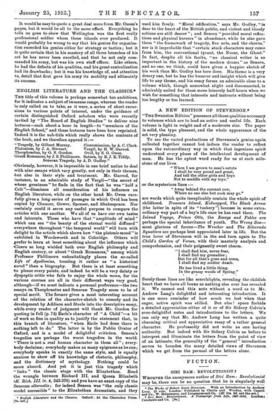ENGLISH LITERATURE AND THE CLASSICS.* THE title of this volume
is perhaps somewhat too ambitious, for it indicates a subject of immense range, whereas the reader is Only called on to take, as it were, a series of short excur- sions to various points of interest, under the guidance of certain distinguished Oxford scholars who were recently invited by " The Board of English Studies " to deliver• nine lectures—each about a hour in length—to "members of the English School," and these lectures have been here reprinted. Indeed it is the sub-title which really shows the contents of the book, and we therefore append it :-
"Tragedy, by Gilbert Murray. Ciceronianism, by A. C. Clark. Platonism, by J. A. Stewart. Vergil, by H. W. Garrod. Theophrastus, by G. S. Gordon. Ovid, by S. G. Owen.
Greek Romances, by J. S. Phillimore. Satura, by H. J. E. Tiddy. Senecan Tragedy, by A.D. Godley."
Obviously, however, it is impossible in one brief notice to deal with nine essays which vary greatly, not only in their themes, -but also in their style and treatment. Mr. Garrod, for instance, in an admirable study of Vergil—" the secret of whose greatness" he finds in the fact that he was " half a Celt"—dismisses all consideration of his influence on English literature, while on the other hand Mr. Owen care- fully gives a long series of passages in which Ovid has been copied by Chaucer, Gower, Spenser, and Shakespeare. Nor certainly could it serve any useful purpose to compare the articles with one another. We all of us have our own tastes and interests. Those who have that "amplitude of mind" which can see "the beauty of the eternal world diffused" everywhere throughout "the temporal world" will turn with 'delight to the article which shows how "the platonic mood" is exhibited in Wordsworth and in Coleridge. Others will prefer to learn at least something about the influence which Cicero so long wielded both over English philosophy and English oratory, or about " Greek Romances," among which Professor Phillimore unhesitatingly places the so-called Life of Apollonius, treating it rather as " a historical novel" than a biography. But there is at least something o please every palate, and indeed he will be a very dainty or dyspeptic critic who fails to enjoy the whole menu, for the
various courses are all in their different ways very good, although—if we must indicate a personal preference—the two essays on Theophrastus and Senecan Tragedy seem to be of special merit. The former• gives a most interesting account .of the relation of the character-sketch to comedy and its
development by Addison and Steele into the descriptive essay, while every reader of judgment will thank Mr. Gordon for• quoting in full (p. 74) Earle's character of "A Child "—a bit of work so fine in quality as to justify the statement that, in this branch of literature, "when Earle had done there is nothing left to do." The latter is by the Public Orator of Oxford, and is a model of delightful criticism. Seneca's tragedies are perhaps the worst tragedies in the world.
" There is not a real human character in them all" ; every- body declaims; everybody makes as many epigrams as he can; everybody speaks in exactly the same style, and is equally anxious to show off his knowledge of rhetoric, philosophy, and the dictionary of mythology. Nothing could be more absurd. And yet it is just this tragedy which " links " the classic stage with the Elizabethan. Read the wrangle between Richard III. and Queen Elizabeth (K. Rich. III. iv. 4, 343-370) and you have an exact copy of the Senecan altercatio; for indeed Seneca was "the only classic model accessible " to the Elizabethan dramatists, and they
English Literature and the Classics. Osiord At the Clarendon Press. [68,-net.] used him freely. "Moral edification," says Mr. Godley, "is dear to the heart of the British public, and violent and bloody actions are still dearer " ; and Seneca "provided moral reflec- tions and physical horrors" in abundance, while he also gave them " the framework of tragedy, five acts, and the chorus," nor is it improbable that "certain stock characters may come from him, the conventional tyrant, the Nurse, the Ghost." In fact, despite all his faults, "no classical writer is so important in the history of the modern drama" as Seneca, and no one, we think, could have given a happier sketch of his work than Mr. Godley has here done. His theme is a very dreary one, but he has the humour and insight which will give life to any theme, and his essay forms an admirable close to a volume which, though somewhat slight and disconnected, is admirably suited for those more leisurely half-hours when we wish for something that interests and instructs without being too lengthy or too learned.


























































 Previous page
Previous page